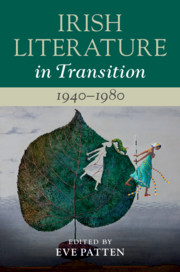Book contents
- Irish Literature in Transition, 1940–1980
- Irish Literature in Transition
- Irish Literature in Transition, 1940–1980
- Copyright page
- Contents
- Contributors
- Series Preface
- General Acknowledgements
- Introduction
- Part I After the War: Ideologies in Transition
- Part II Genres in Transition
- Part III Sex, Politics and Literary Protest
- Part IV Identities and Connections
- Chapter 13 State, Space and Experiment in Irish-Language Prose Writing
- Chapter 14 Anglo-Ireland: the Big House Novel in Transition
- Chapter 15 American–Irish Literary Relations
- Chapter 16 ‘Home Rule in Our Literature’: Irish–British Poetic Relations
- Part V Retrospective Frameworks: Criticism in Transition
- Index
Chapter 15 - American–Irish Literary Relations
from Part IV - Identities and Connections
Published online by Cambridge University Press: 28 February 2020
- Irish Literature in Transition, 1940–1980
- Irish Literature in Transition
- Irish Literature in Transition, 1940–1980
- Copyright page
- Contents
- Contributors
- Series Preface
- General Acknowledgements
- Introduction
- Part I After the War: Ideologies in Transition
- Part II Genres in Transition
- Part III Sex, Politics and Literary Protest
- Part IV Identities and Connections
- Chapter 13 State, Space and Experiment in Irish-Language Prose Writing
- Chapter 14 Anglo-Ireland: the Big House Novel in Transition
- Chapter 15 American–Irish Literary Relations
- Chapter 16 ‘Home Rule in Our Literature’: Irish–British Poetic Relations
- Part V Retrospective Frameworks: Criticism in Transition
- Index
Summary
This chapter examines some key developments in Irish-American literary relations from the middle of the century to the 1980s. It begins by arguing that this was a period when Irish-American literary relations acquired a new complexity – in both the reception of the work of Irish writers in the United States and the emergence of a distinctive and authoritative Irish-American voice. It then goes on to examine the distinctive contribution of Irish and Irish-American writers to the development of the short story as a form in the United States, which was a process mediated and galvanised by the literary magazine The New Yorker, the natural habitat of writers such as John O’Hara and Maeve Brennan and, later, Elizabeth Cullinan. The chapter then discusses the expansion of the Irish-American literary canon from mid-century onwards and explores how key figures such as Edward McSorley, James T. Farrell, Mary McCarthy and Mary Gordon sought to engage with or contest influential Irish and Irish-American literary inheritances. These writers’ commitment to social realism invented a new version of Irish-America during these decades of cultural transition, one that often deliberately set itself apart from previous received scripts and mythmaking.
Keywords
- Type
- Chapter
- Information
- Irish Literature in Transition, 1940–1980 , pp. 272 - 287Publisher: Cambridge University PressPrint publication year: 2020

